Community Shootaround: Who Will Come Out Of The East?
The Pistons have held the No. 1 seed in the Eastern Conference since early November and have maintained a firm grip on that spot. At 42-14, Detroit has a 4.5-game lead on its next-closest competitor in the conference and has a 10-2 record against the other Eastern teams currently in playoff (ie. top-six) position.
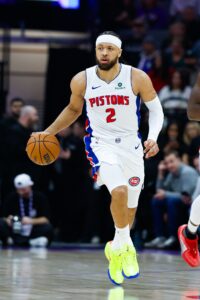 However, there are still questions about the Pistons’ ability to win three consecutive playoff series and represent the Eastern Conference in the 2026 NBA Finals. A relative lack of postseason experience is one potential concern. Detroit’s first-round exit last spring represented the team’s first playoff appearance since 2019 and the only taste of the postseason that young stars like Cade Cunningham and Jalen Duren have gotten so far.
However, there are still questions about the Pistons’ ability to win three consecutive playoff series and represent the Eastern Conference in the 2026 NBA Finals. A relative lack of postseason experience is one potential concern. Detroit’s first-round exit last spring represented the team’s first playoff appearance since 2019 and the only taste of the postseason that young stars like Cade Cunningham and Jalen Duren have gotten so far.
A lack of offensive firepower is another possible red flag for the Pistons. The team leans heavily on Cunningham for scoring and shot creation and lacks reliable play-makers and knock-down shooters alongside him. Detroit ranks 28th in the NBA in three-point makes per game (11.1).
Monday’s loss to San Antonio exposed those flaws and cast a spotlight on Trajan Langdon‘s decision not to be more aggressive at this month’s trade deadline, notes Omari Sankofa II of The Detroit Free Press (subscription required). The Pistons’ only real pre-deadline acquisition was wing Kevin Huerter, who has struggled with his outside shot this season and fallen out of the team’s rotation in the past three games.
If not the Pistons, who else could come out of the East this spring? Well, the Celtics hold the No. 2 seed despite being without Jayson Tatum all season as the All-NBA forward recovers from an Achilles tear. With Jaylen Brown taking on the primary role, Boston has built the best offense in the conference without its usual leading scorer, writes Esfandiar Baraheni of The Athletic, posting a 120.0 offensive rating that exceeds the team’s mark from 2024/25.
Still, there’s no guarantee Tatum will be able to return to action before the end of this season, and the Celtics would miss him more in big postseason moments than they do in a typical regular season game. And even if Tatum does make it back in the coming weeks, is it realistic to expect him to be back to his old self in time for the playoffs after such a lengthy layoff and challenging rehab process?
The Knicks, who have the NBA’s third-best offensive rating, hold the No. 3 spot in the East at 37-22 and are coming off a conference finals appearance in 2025. New York is a good team, but under new head coach Mike Brown, the club has also looked “like a world beater one quarter and a bottom-feeder the next,” according to James L. Edwards III of The Athletic, who suggests we may not know for sure until the playoffs how good the Knicks really are.
Interestingly, none of those three teams are currently the betting favorites to win the East, according to most sportsbooks. That honor belongs to the Cavaliers, who have looked resurgent in recent weeks after a shaky start to the season and have pulled into a tie with the Knicks at 37-22. The Cavs, winners of 13 of their past 15 games, have “renewed confidence” following the deadline acquisition of James Harden, head coach Kenny Atkinson said following his team’s victory over New York on Tuesday (story via Jamal Collier of ESPN).
“We understand we’re a better team,” Atkinson said. “That spirit, that confidence for some strange reason, it makes you play harder, compete harder, compete harder defensively. I felt like we were kind of missing that edge, that belief. I feel like we’re regaining that. A lot of it has to do with who we added in the trade.”
The Cavaliers were widely viewed as a favorite to win the East in the fall after winning 64 regular season games in 2024/25 and being derailed by injuries in the playoffs. Enthusiasm about their ceiling waned as they hovered around .500 through Christmas, but it has been building again as of late. For what it’s worth, the Cavs are also the only one of the East’s projected playoff teams that doesn’t have a losing record against the Pistons so far in ’25/26 — the teams have split their two matchups.
The Raptors, Sixers, Magic, Heat, Hawks, and Hornets are all lurking in the Eastern Conference playoff picture as potential threats.
A Philadelphia team that has Joel Embiid and Paul George wouldn’t be an easy out. The same is true of a fully healthy Orlando squad, though we haven’t seen that very often in the past year or two. Charlotte still has a ways to go to even make the playoffs and would be an underdog in a first-round series, but few teams have been hotter in recent weeks — since January 22, only the Cavs (12-2) and Spurs (11-2) have a better record than the Hornets (12-3).
We want to know what you think. Which team do you expect to represent the East in the NBA Finals this season? Is Tatum’s potential return the wild card that could swing your decision or are there other factors you think will ultimately determine how the postseason plays out in the Eastern Conference?
Head to the comment section below to weigh in with your thoughts!
Community Shootaround: Pistons’ Trade Deadline Approach
The Pistons extended their lead at the top of the Eastern Conference on Monday by pulling out a one-point victory over the No. 2 Celtics. At the midway point of the season, Detroit holds a 31-10 record and is ahead of Boston by five-and-a-half games in the standings.
 Still, even with the conference title seemingly up for grabs, the common refrain out of Detroit in recent months has been that the Pistons aren’t operating with any urgency and are unlikely to make an all-in move prior to this season’s trade deadline. That’s still the case, according to ESPN’s Tim MacMahon, who likened this year’s Pistons to the 2023/24 Thunder on the most recent episode of the Hoop Collective podcast (YouTube link).
Still, even with the conference title seemingly up for grabs, the common refrain out of Detroit in recent months has been that the Pistons aren’t operating with any urgency and are unlikely to make an all-in move prior to this season’s trade deadline. That’s still the case, according to ESPN’s Tim MacMahon, who likened this year’s Pistons to the 2023/24 Thunder on the most recent episode of the Hoop Collective podcast (YouTube link).
Although that Oklahoma City team ended up winning 57 games, it wasn’t a big-time buyer at the trade deadline. The Thunder made a February deal for veteran forward Gordon Hayward, but also helped accommodate the Mavericks’ acquisition of Daniel Gafford by making a draft-pick trade with Dallas that netted OKC a 2028 first-round swap. It wasn’t until the subsequent offseason that the Thunder made moves for Isaiah Hartenstein and Alex Caruso that set up their ’24/25 championship run.
“(The Pistons) are very much in a patient, methodical mindset,” MacMahon said. “… Opportunistic, but they’re talking more, ‘Hey, we’ve got that (Dennis) Schröder (trade) exception (worth $14MM+). We could use that to facilitate a deal, get another asset, probably a first-round pick or something like that.’ They’re more in that mindset than they are, ‘Oh, gotta get the finishing piece now.’ Part of that is they want to give the guys that they have a chance to prove who they are – or who they’re not – come playoff time.”
MacMahon also observed that the Pistons will have to sign center Jalen Duren to a lucrative new contract during the 2026 offseason when he reaches restricted free agency, so any moves they make now will be made with a long-term view of their cap situation in mind.
While ESPN’s Tim Bontemps didn’t dispute his colleague’s reporting, he made it clear he’d like to see the Pistons be a little more aggressive, given the fact that they have a potential path to the NBA Finals. Pointing out that Detroit could use another ball-handler to help take the pressure off of Cade Cunningham, Bontemps identified a specific player he views as an ideal fit.
“The guy I really want the Pistons to get – who they probably can’t get and I don’t know what his health status would be – the guy they need is Kyrie Irving,” Bontemps said. “If I was (Pistons president of basketball operations) Trajan Langdon, I would want to know where Kyrie’s health is at and what the chances of him playing are. That’s the call that I’d be making.
“… The realized version of Kyrie Irving, playing next to Cade like he played next to Luka (Doncic), like he played next to LeBron (James) as a proven playoff scorer — that’s who they need.”
Irving is making his way back from a torn ACL. It’s unclear whether or not he’ll play this season, and there has been no indication that the Mavericks have any interest in moving him anyway, so the idea of the Pistons making a trade for the nine-time All-Star is probably a long shot.
Who else could fill that backcourt need for Detroit? Former No. 5 overall pick Jaden Ivey is the most obvious in-house candidate.
Ivey appeared well on his way to a breakout season a year ago before a broken leg prematurely ended his season in early January. The fourth-year guard is back in action this season, but has averaged a career-low 17.0 minutes per game and is contributing just 8.4 points per night. In other words, it’s hard to count on him in the short term to fill that role as a secondary ball-handler and scorer for a Pistons team with aspirations of making a deep playoff run.
Armed with some expiring salary, all their future first-round picks, a $14MM+ trade exception, and plenty of breathing room below the luxury tax line, the Pistons are in position to consider a wide range of trade candidates. Bontemps hopes they’ll do so, but acknowledges they’re far from desperate.
“If the Pistons don’t do anything, I’ll understand it,” Bontemps said. “And to be clear, I do not think they should make some rash trade and trade two or three first(-round picks) for some mediocre player to fit in. I brought up Kyrie for a reason. He’s on a short-term deal, he’s the exact skill set they need. If he was healthy and available and they could get him (and) you plug him into that team, I would tell you, I think Detroit could win the title. I wouldn’t bet on it, but right now their offense isn’t good enough to win the title, I don’t think, against the elite teams.”
We want to know what you think. How should the Pistons approach the trade deadline and how aggressive should they be? Are they the favorites to come out of the East even without making a deal? If not, what sort of move would get them there? And are there any other spots on their depth chart they should consider addressing outside of the backcourt?
Head to the comment section to weigh in with your thoughts!
Community Shootaround: Next Steps For Warriors
Monday’s victory over Miami should have represented a new high point for the 2025/26 Warriors, who registered their fourth consecutive win and moved to six games above .500 (25-19) for the first time this season.
Instead, they’re facing an uncertain second half without star wing Jimmy Butler, who suffered a torn right ACL that will bring his season to an early end and limit the short-term ceiling of this Golden State team.
Even before Butler’s injury, there were questions about the Warriors’ ability to legitimately contend for a title this season. They’ve hovered around .500 for most of the season, and despite their recent hot streak, they still rank just eighth in the West.
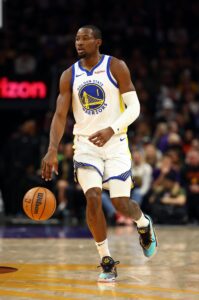 Still, if the club had stayed healthy and been able to turn trade candidate Jonathan Kuminga (and maybe a draft pick or two) into another quality rotation player, it wasn’t hard to envision the Warriors securing a playoff spot and becoming a tough out in the postseason. That’s a more difficult outcome to imagine with Butler sidelined the rest of the way.
Still, if the club had stayed healthy and been able to turn trade candidate Jonathan Kuminga (and maybe a draft pick or two) into another quality rotation player, it wasn’t hard to envision the Warriors securing a playoff spot and becoming a tough out in the postseason. That’s a more difficult outcome to imagine with Butler sidelined the rest of the way.
With 16 days left until February 5, the Warriors will now have to reevaluate their approach to this season’s trade deadline. Kuminga is at the center of those plans. A deal involving the former No. 7 overall pick had long seemed like a foregone conclusion, even before he demanded a change of scenery upon becoming trade-eligible last week.
But with Butler out, could there be a pathway to Kuminga reentering the rotation? The fifth-year forward has been held out of 16 games in a row and has played fewer than 10 total minutes since December 6, but head coach Steve Kerr said on Monday that he’d “absolutely” consider using Kuminga going forward.
According to Nick Friedell of The Athletic, Kuminga declined comment when approached after Monday’s game, but when Kerr was asked if the 23-year-old would be ready to play, the Warriors’ coach simply replied, “Yeah.”
Appearing on SportsCenter (Twitter video link), ESPN’s Shams Charania acknowledged the possibility of Kuminga rejoining the rotation, but cited sources who say the relationship between the forward and Kerr is “fractured beyond repair.” Noting that the Kings are still interested in Kuminga after pursuing him as a restricted free agent over the summer, Charania wonders if the Warriors will instead try to use Kuminga as a trade chip to acquire a replacement for Butler, such as Sacramento’s DeMar DeRozan.
While some teams would transition from buyers to sellers after losing a maximum-salary star to a season-ending injury, that would probably be a last resort in Golden State. The Warriors want to do all they can to make the most of the time they have left with Stephen Curry, who will turn 38 in March.
Besides Kuminga, the Warriors could make players like Buddy Hield ($9.2MM cap hit) and Moses Moody ($11.6MM) available in trade talks, and they have the ability to trade multiple first-round picks and/or swaps — only their 2030 pick is partially constricted (it’ll be sent to Washington if it falls outside of the top 20).
Still, Golden State is currently operating within $300K of its second-apron hard cap and will have limited financial flexibility in trade discussions. Additionally, Butler’s contract ($54.1MM this season; $56.8MM in 2026/27) will be problematic — he won’t have any value on the trade market following his ACL tear, but building a roster capable of winning playoff series will be extremely difficult as long as his contract remains on the books and he remains off the court.
We want to know what you think. What’s next for the Warriors after Butler’s injury? Will we see Kuminga on the floor as a Warrior again? What should Golden State do at the trade deadline?
Head to the comment section below to weigh in with your thoughts and predictions!
Community Shootaround: 65-Game Eligibility Rule
Imagine All-NBA teams without Nikola Jokic, Luka Doncic, Giannis Antetokounmpo, Anthony Edwards, Victor Wembanyama and Stephen Curry.
No need to tax your brain. There’s a real possibility that each of those superstars, as well as several others, won’t be eligible for postseason awards this season.
The 65-game rule built into the most recent Collective Bargaining Agreement prohibits players who don’t take the court for at least that many regular season games from most postseason honors.
The spirit of the rule, if you will, was to discourage load management and tanking. However, the frequency of injuries across the league could severely impact those awards, which include Most Valuable Player, Defensive Player of the Year, Most Improved Player, the All-NBA teams and the All-Defensive teams.
Jokic will almost certainly not qualify this season, as he’s currently rehabbing a knee injury that will keep him out a month.
Doncic has already missed seven games. Antetokounmpo and Wembanyama are teetering on the brink, having missed 14 games apiece. Edwards (8) and Curry (10) are also in danger of failing to meet the criteria, considering the season is just approaching the halfway point.
There are some minor exceptions to the rule – for example, a player who falls short of the 65-game minimum can also file an “Extraordinary Circumstances Challenge” in an effort to regain his award eligibility. But it’s likely that if a player doesn’t suit up for 65 games, they’ll be disqualified for those coveted awards.
There are also, of course, some financial implications regarding the awards, such as qualifying for super-max extensions.
The flip side is that the league wants to give its paying customers the best product possible. All too often, fans are paying big bucks, only to see their favorite players sitting in street clothes due to a minor ailment or load management.
That brings us to today’s topic: Do you like the 65-game rule for postseason awards? If not, what would be a fairer system for eligibility – should the rule be tweaked or scrapped altogether?
Please take to the comments section to weigh in on this topic. We look forward to your input.
Community Shootaround: NBA’s Christmas Day Schedule
Merry Christmas from the Hoops Rumors staff!
As usual, December 25 features a full slate of five NBA games that tipped off at noon Eastern time and will run well past midnight. The Cavaliers visited the Knicks at Madison Square Garden in the day’s early game, which will be followed by four Western Conference matchups:
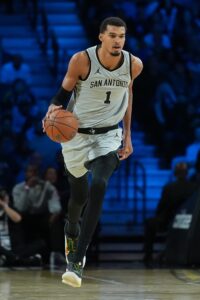 2:30 pm ET: San Antonio Spurs (22-7) at Oklahoma City Thunder (26-4)
2:30 pm ET: San Antonio Spurs (22-7) at Oklahoma City Thunder (26-4)- 5:00 pm ET: Dallas Mavericks (12-19) at Golden State Warriors (15-15)
- 8:00 pm ET: Houston Rockets (17-10) at Los Angeles Lakers (19-9)
- 10:30 pm ET: Minnesota Timberwolves (20-10) at Denver Nuggets (21-8)
Having the Spurs visit the defending champion Thunder on Christmas Day, with Victor Wembanyama coming off a major health issue and San Antonio having won just 34 games last season, was a risk. But it has paid off in a major way for the NBA — the Spurs have already upset the Thunder twice this month, and this will be just the second time in the past 40 years that the Western Conference’s top two teams have faced one another on December 25, per the league (Twitter link).
The rest of the teams currently holding playoff spots in the West – the Rockets, Lakers, Timberwolves, and Nuggets – will be in action in the final two games of the day, while the Warriors/Mavericks contest is the only contest to feature two teams outside the top six. However, Dallas has looked much improved as of late, having gone 7-4 after a 5-15 start. With Anthony Davis healthy and Cooper Flagg beginning to show his star-level upside more consistently, that bout with Stephen Curry and Golden State is hardly a bust.
With so much uncertainty surrounding the top Eastern Conference teams entering the season, the NBA was probably right to lean heavily on Western matchups, and it looks like the league picked the right teams. The Suns are the only top-eight club in the conference not in action today, and the Mavs – thanks to the presence of Davis and Flagg – are a compelling alternative despite ranking 11th.
While it’s disappointing not to see the 24-6 Pistons in action today, the league probably couldn’t have predicted that Detroit would be this good in the first half. Sticking with the Cavaliers and Knicks was a safe choice — Cleveland and New York were two of the last four Eastern Conference teams left standing in 2024/25, and the other two (Boston and Indiana) are both missing a star player due to an Achilles tear.
What do you think? Are you happy with the NBA’s Christmas Day slate? Would you have shuffled around any of the matchups, or avoided scheduling any of these 10 teams in favor of another? Which of the rest of today’s games are you most looking forward to?
Head to the comment section to share your thoughts, and enjoy the holiday basketball!
Community Shootaround: No. 1 Prospect In 2026 Draft
Ahead of the 2026 NBA draft, there is widely considered to be a three-player race for the top overall prospect and No. 1 overall pick. Kansas guard Darryn Peterson is ranked No. 1 on Jeremy Woo of ESPN’s latest big board, followed by BYU wing AJ Dybantsa and Duke forward/center Cameron Boozer.
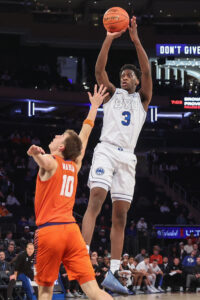 Woo and Jeff Borzello of ESPN recently spoke to several NBA scouts and college coaches to get their impressions of the three freshmen, who are all viewed as “legitimate No. 1 prospects” who simply happen to be in the same class.
Woo and Jeff Borzello of ESPN recently spoke to several NBA scouts and college coaches to get their impressions of the three freshmen, who are all viewed as “legitimate No. 1 prospects” who simply happen to be in the same class.
Peterson has been highly productive when healthy, but missed seven games with a hamstring injury and was forced to leave his most recent contest due to quad cramps. In four games, he has averaged 19.3 points, 3.8 rebounds, 2.8 assists and 1.3 steals, with a shooting slash line of .528/.423/.769.
One Eastern Conference scout said the 6’5″ combo guard, who is touted as an explosive — and consistent — offensive player, was the top prospect on his board and it was hard to envision that changing no matter how well Dybantsa and Boozer play for the remainder of the season. While one coach had questions about Peterson’s ability to run the point, a different Eastern scout said that shouldn’t be an issue at the next level.
“What a point guard is now in the NBA, he’s that,” the scout told ESPN. “Are you able to create advantages, are you able to [be a] play-maker, are you a scorer when you see a defense break down? Darryn can do all those things.”
Dybantsa, a 6’9″ forward, is generally considered to have the most upside of anyone in the class, with outside shooting and consistency viewed as his biggest question marks. In 11 games, he’s averaging 21.1 PPG, 7.0 RPG, 3.3 APG and 1.3 SPG on .556/.321/.743 shooting.
“I would have AJ No. 1 still,” one Western Conference scout told ESPN. “The positional versatility, the size, is so unique. His ability to be able to create off the dribble, be dynamic from the mid-post. The fadeaway jumpers, that style of play. I think he can make really crisp passes off one hand, really good adjusting midair. … He takes long strides on defense, someone that you can insert in very different lineups playing different positions.”
As Woo and Borzello detail, Boozer had an extremely impressive résumé prior to entering college, winning four high school state championships in Florida and two gold medals — and two MVPs — with Team USA (at the FIBA U16 AmeriCup in 2023 and the FIBA U17 World Cup in 2024).
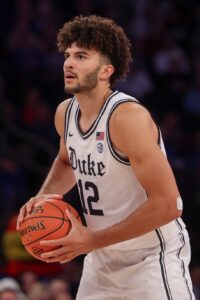 The son of former NBA All-Star Carlos Boozer has been the most productive college player in the country in the early portion of the season (he’s averaging 23.3 PPG, 10.2 RPG, 3.7 APG and 1.6 SPG on .563/.348/.789 shooting through 11 games) and is the favorite to win Player of the Year for the 11-0 Blue Devils. However, questions persist about the younger Boozer’s athleticism and upside at the NBA level, at least relative to Peterson and Dybantsa.
The son of former NBA All-Star Carlos Boozer has been the most productive college player in the country in the early portion of the season (he’s averaging 23.3 PPG, 10.2 RPG, 3.7 APG and 1.6 SPG on .563/.348/.789 shooting through 11 games) and is the favorite to win Player of the Year for the 11-0 Blue Devils. However, questions persist about the younger Boozer’s athleticism and upside at the NBA level, at least relative to Peterson and Dybantsa.
“Can you put the ball in his hands and you know he’s going to be able to get a bucket or create something at the end of a game, when the game’s on the line? Is he good enough at that at the NBA level?” an Eastern Conference scout said, per ESPN. “It’s not a knock on Cam, it’s just that those other two guys have the potential to be the best player on NBA championship teams.”
We want to know what you think. In what seems to be an eye-of-the-beholder draft, which prospect would you currently rank No. 1 overall? Do you agree that any of the three would ordinarily be considered top overall prospects in their own right? Head to the comments section to weigh in with your thoughts!.
Community Shootaround: Knicks’ Title Drought
The Knicks finally stood atop the NBA world this week, even if it was just the in-season tournament. Winning the NBA Cup was a nice way to head into the holidays but the franchise and its fans are looking for something much bigger – a trip to the Finals and the Larry O’Brien trophy.
They reached the Eastern Conference Finals last season for the first time in a quarter century, only to get knocked out by the underdog Pacers. They haven’t sniffed the Finals since the 1998/99 season, when the Spurs’ Twin Towers of David Robinson and Tim Duncan bounced them in a five-game series.
As their long-time fans know, the Knicks haven’t hoisted the trophy since 1973, when the iconic starting five of Willis Reed, Walt Frazier, Dave DeBusschere, Bill Bradley and Earl “The Pearl” Monroe carried them past the Lakers.
The Eastern Conference certainly seems ripe for the taking. The Pistons have been nothing short of marvelous during the first two months of the season but they haven’t won a playoff series since 2008.
The Cavaliers, who rolled to the top seed in the conference last season, are hovering around .500. Perhaps a young team like the Magic can get hot at the right time, but currently the Knicks are a solid favorite to come out of the East.
Via trades and free agency, the Knicks have assembled a formidable starting five (or six, if you count Mitchell Robinson) in Most Valuable Player candidate Jalen Brunson, Karl-Anthony Towns, OG Anunoby, Mikal Bridges and Josh Hart.
Offensively, they rank in the top five in points and three-point shooting while keeping their turnovers down. Defensively, they rank in the top five in opponents’ field goal percentage.
Their bench may be somewhat underwhelming, though they have some veteran pieces. Their ability to make moves is severely hamstrung by the fact that they’re hard-capped and operating narrowly below the second tax apron.
That brings us to today’s topic: Is this the season the Knicks finally reach the Finals again and perhaps even win the championship for the first time in 53 years? If not, what do you think will hold them back?
Please take to the comments section to weigh in on this topic. We look forward to your input.
Community Shootaround: Thunder’s Dominance
The NBA has spent the last decade or so trying to keep the playing field level. The aim for parity generally seems to be working, especially with the restrictive tax aprons making it difficult for some contenders to make meaningful roster moves.
Only one problem: The Thunder, thanks to draft pick hoarding maneuvers by top executive Sam Presti, seem almost invincible.
Courtesy of the highly productive 2019 Paul George trade with the Clippers, the Thunder acquired a superstar in Shai Gilgeous-Alexander along with multiple first-round picks. The reigning Most Valuable Player led them to last season’s championship and seems poised to do so again.
The Thunder have a ridiculous 24-1 record and could break Golden State’s record of 73 regular season victories.
They rank in the top five in nearly every offensive and defensive statistical category. They’ve achieved this despite their second-best player, Jalen Williams, appearing in only six games. He’s rounding back into form after recovering from a wrist injury – he had a 25-point, 8-assist performance against Utah on Sunday.
Oklahoma City has arguably the deepest team in the league and heads into the NBA Cup semifinals this weekend after thrashing the Suns by 49 points in the quarterfinals.
What makes the Thunder even scarier is that they could legitimately control the next few drafts. They have a shot at multiple lottery picks next June, including the reeling Clippers’ unprotected first-rounder.
Imagine dropping AJ Dybantsa, Darryn Peterson or Cameron Boozer onto this already loaded roster. OKC is also owed multiple first-rounders in the 2027 draft as well.
Of course, trying to retain all their top players will eventually create luxury tax issues for the Thunder. It’s still hard to envision this franchise not being a dynasty.
That brings us to today’s topic: Will the Thunder breaks the Warriors’ record of 73 regular-season wins this season? Are they destined to win back-to-back championships? If not, which team can prevent them from taking the title again? How many titles can the Thunder win over the next decade?
Please take to the comments section to weigh in on this topic. We look forward to your input.
Community Shootaround: Chris Paul
Chris Paul is technically still a member of the Clippers. The veteran point guard won’t become trade-eligible until December 15, and waiving him now would result in roster- and cap-related complications for an L.A. team that has less than $1.3MM in breathing room below its hard cap.
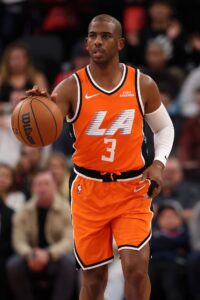 However, Paul has played his last game for the Clippers, who announced overnight on Tuesday that they’re “parting ways” with the 40-year-old. The surprising news came less than two weeks after Paul confirmed that the 2025/26 season would be his last as an NBA player.
However, Paul has played his last game for the Clippers, who announced overnight on Tuesday that they’re “parting ways” with the 40-year-old. The surprising news came less than two weeks after Paul confirmed that the 2025/26 season would be his last as an NBA player.
This wasn’t how Paul envisioned his career coming to an end and it’s not how he wants to go out. Appearing on ESPN’s NBA Today on Thursday, Marc J. Spears of Andscape confirmed as much (Twitter video link).
“So, the big question: Does he want to retire? Is he done? I was told absolutely not,” Spears said. “He does want to play.”
Still, finding a logical landing spot for the 21-year veteran will be much more difficult now than it would have been a decade or two ago.
Paul’s performance dropped off a cliff this fall after he started all 82 games for the Spurs last season. He averaged 14.3 minutes per game in 16 outings for the Clippers, posting career-low averages of 2.9 points and 3.3 assists with a brutal .321/.333/.500 shooting line.
There are respected veterans who barely play at all occupying 14th or 15th roster spots around the NBA due to their impact in the locker room, but Paul isn’t the sort of player who would be a positive presence in any situation. Reporting in the wake of his divorce with the Clippers suggested that teammates and others within the organization had tired of his “acerbic” and “disparaging” feedback behind the scenes, which came off as “grating” and unhelpful in a veteran locker room.
“You have to have a unique situation to (bring in Paul),” one league executive told Steve Bulpett of Heavy.com. “You’ve got to be a team that thinks, ‘Hey, man, we’re one guy away. We can deal with the other stuff that comes with it.’ Your team has to have strong internal discipline already. You’ve got to be able to accept the whole CP3 experience.”
Paul’s outspoken style of leadership is “part of what you get with him,” but might be more welcome in the right situation, especially if he can contribute a little more on the court than he did as a Clipper, another front office source told Bulpett.
“We looked at him after all this came down, but it wasn’t a long discussion,” that source said. “I could actually see him fitting with a team in the East, because that’s so wide open. I think he could help a team like Orlando or maybe Detroit, where he could take some of the pressure off Cade (Cunningham).
“But you have to first figure out whether you’re even able to get him with your cap situation and what you’d have to do with your roster to bring him in. Then you have to look at what you have for chemistry and all that — how strong your coaching situation is, how the players would react to another strong voice. We have a guy who played with him who I think put it best: ‘Chris Paul is an acquired taste.’ He’s not everybody’s cup of tea.”
Outside of the personality-, roster-, and cap-related challenges involved in finding a new destination for Paul, there’s also the matter of how many different situations he would be open to. During the offseason, he chose the Clippers in large part because he wanted to be close to his family in Los Angeles. Would CP3 consider an East Coast team? According to Spears, he was told that Paul will “cross that bridge when he gets there.”
We want to know what you think. Do you think Paul could still be a valuable addition to a roster in his final NBA season? If so, what team would be the best fit for him? Will the Clippers be able to make a trade, or will they have to waive Paul and eat his guaranteed minimum salary?
Head to the comment section below to weigh in with your thoughts!
Community Shootaround: Early Impressions Of 2025/26 Rookies
Entering the 2025/26 season, No. 1 overall pick Cooper Flagg was widely regarded as the favorite to become this season’s Rookie of the Year. However, through the first five-plus weeks this fall, one of his former Duke teammates, Kon Knueppel, has been the most impressive player from the NBA’s 2025 draft class.
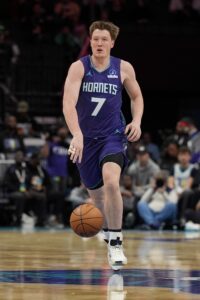 Knueppel, who was selected fourth overall by the Hornets in June, has averaged 18.6 points per game in his first 18 NBA outings, posting an excellent .476/.417/.884 shooting line and chipping in 5.7 rebounds and 2.8 assists in 33.3 minutes per night. Outside of one game in the first week of the season, he has been a permanent fixture in the Hornets’ starting lineup and has already made a significant impression on his veteran teammates.
Knueppel, who was selected fourth overall by the Hornets in June, has averaged 18.6 points per game in his first 18 NBA outings, posting an excellent .476/.417/.884 shooting line and chipping in 5.7 rebounds and 2.8 assists in 33.3 minutes per night. Outside of one game in the first week of the season, he has been a permanent fixture in the Hornets’ starting lineup and has already made a significant impression on his veteran teammates.
“He’s been great,” Hornets forward Miles Bridges said of Knueppel, per Roderick Boone of The Charlotte Observer. “(He’s) been our best player. He’s been consistent and he brings it every game, every day. That’s just the type of player he is, so it’s been great playing with him.”
Knueppel ranks first among NBA rookies in scoring and is among the league leader in three-pointers made — only Stephen Curry, Tyrese Maxey, Donovan Mitchell, and James Harden have made more outside shots than Knueppel (63), and none of those four veterans are knocking them down at a higher percentage than the Charlotte rookie is.
As Boone points out, BetOnline.ag now lists Knueppel as the betting favorite for this season’s Rookie of the Year award, but he’s hardly the only first-year player who has gotten off to a promising start.
Flagg has been a little up and down for the Mavericks, in part because he was asked to open the season as the team’s primary point guard. However, he has been shooting the ball more consistently as of late (above 50% in his past eight games) and has increased his scoring average to 15.9 PPG while also contributing 6.4 RPG and 3.1 APG.
No. 2 overall pick Dylan Harper missed some time due to a calf strain, but he has looked good in his seven appearances so far, averaging 13.0 PPG, 3.9 RPG, and 3.6 APG on .472/.375/.850 in a limited bench role for the Spurs (22.4 MPG). His overall plus/minus mark of +43 ranks second among rookies, despite the fact that he’s only played 157 minutes so far.
The top-ranked rookie in overall plus/minus is Sixers guard VJ Edgecombe at +44. The third overall pick is right behind Flagg in points per game (15.6) and has been an effective three-point shooter (.366 3PT%) while also leading all rookies in assists per game (4.2).
While the odds favor one of those top four picks in the draft earning Rookie of the Year honors, there are other legitimate contenders further down the 2025 draft board. Grizzlies forward Cedric Coward, for example, has earned a spot in Memphis’ starting lineup and has performed admirably in that role, with season-long averages of 13.7 PPG, 6.0 RPG, and 2.8 APG on .466/.375/.864 shooting.
In New Orleans, lottery picks Jeremiah Fears and Derik Queen have been two bright spots amid a disappointing start for the Pelicans. Fears is averaging 15.1 PPG with a .453/.365/.786 shooting line, while Queen is filling up the box score with 15.7 points, 7.1 rebounds, 5.4 assists, 1.1 blocks, and 1.0 steals per game in his past nine contests. Both players are currently part of New Orleans’ starting lineup.
Knueppel’s teammate Ryan Kalkbrenner (9.3 PPG, 6.8 RPG, 1.8 BPG, .802 FG%) and Jazz forward Ace Bailey (15.0 PPG on .532/.409/.714 shooting in his past seven games) are a couple more first-year players who have looked pretty good so far.
We want to know what you think. Who are your favorite players from the 2025 draft class? Which of these players do you expect to emerge as the Rookie of the Year favorite? Whose long-term futures are you most excited about?
Head to the comment section below to weigh in with your thoughts!
